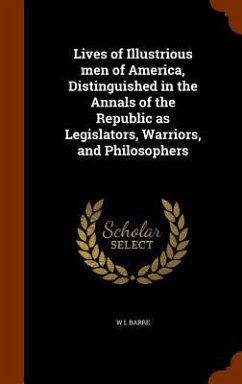
Lives Of Distinguished American Naval Officers (Volume Ii)

PAYBACK Punkte
11 °P sammeln!
Lives Of Distinguished American Naval Officers (Volume Ii) has been considered by academicians and scholars of great significance and value to literature. This forms a part of the knowledge base for future generations. So that the book is never forgotten we have represented this book in a print format as the same form as it was originally first published. Hence any marks or annotations seen are left intentionally to preserve its true nature.








![The Book of the Indians of North America [microform]: Comprising Details in the Lives of About Five Hundred Chiefs and Others, the Most Distinguished Cover The Book of the Indians of North America [microform]: Comprising Details in the Lives of About Five Hundred Chiefs and Others, the Most Distinguished](https://bilder.buecher.de/produkte/65/65514/65514919n.jpg)



